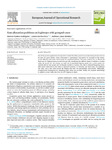Cost allocation problems on highways with grouped users

View/
Use this link to cite
http://hdl.handle.net/2183/36163Collections
- Investigación (FHUM) [116]
Metadata
Show full item recordTitle
Cost allocation problems on highways with grouped usersDate
2024-07Citation
M. Gómez-Rodríguez, L. Davila-Pena and B. V. Casas-Méndez, "Cost allocation problems on highways with grouped users", European Journal of Operational Research, Vol. 316, Issue 2, Pp. 667-679, Jul. 2024, doi: 10.1016/j.ejor.2024.02.011
Abstract
[Abstract]: One of the practical applications of cooperative transferable utility games involves determining the fee structure for users of a given facility, whose construction or maintenance costs need to be recouped. In this context, certain efficiency and equity criteria guide the considered solutions. This paper analyzes how to allocate the fixed costs of a highway among its users through tolls, considering that different classes of vehicles or travelers utilize the service. For this purpose, we make use of generalized highway games with a priori unions that represent distinct user groups, such as frequent travelers or truckers, who, due to enhanced bargaining power, often secure reductions in their fares in real-world scenarios. In particular, the Owen value, the coalitional Tijs value, and a new value termed the Shapley–Tijs value are axiomatically characterized. Additionally, straightforward formulations for calculating these values are provided. Finally, the proposed methodology is applied to actual traffic data from the AP-9 highway in Spain.
Keywords
A priori unions
Coalitional values
Cost allocation
Game theory
Generalized highway problems
Coalitional values
Cost allocation
Game theory
Generalized highway problems
Editor version
Rights
Atribución 3.0 España






